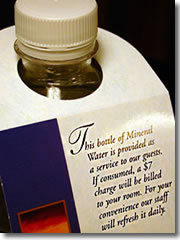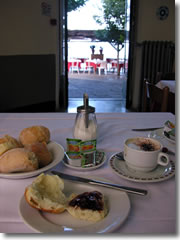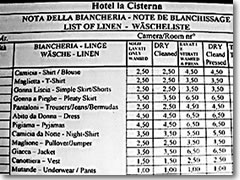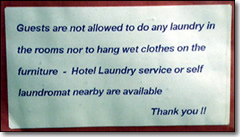- Places
- Plans
- Itineraries
- Experiences
 Yes, this bottle of water being provided "as a service to our guests" costs a mere $7. Now that's what I call service! (Tip: suck it out of the tap in the bathroom sink ten feet away and it's free.)
Yes, this bottle of water being provided "as a service to our guests" costs a mere $7. Now that's what I call service! (Tip: suck it out of the tap in the bathroom sink ten feet away and it's free.)
I have nothing against hotels, but some of their common charging practices are so sneaky as to almost qualify as criminal. Almost.
This page is not about outright thievery—that rare front-desk clerk who will try to slip in an extra night's charge on unsuspecting guests (in 25 years of Italian travel—including 15 years of researching and writing guidebooks and magazine articles—that has happened to me precisely once).
Many hotels, though, try to squeeze every Euro they can out of you beyond the cost of the room. Because, hey: once you're booked in, you're bound to get thirsty and give into the temptation of that Coke in the minibar, or want to phone some great-sounding restaurant to make reservations for the evening or (God forbid) make a quick call home, or you may eventually want to, you know, eat breakfast or something. And then they have you.
Let the fleecing of the unawares begin!
There are five main hotel rip-offs in Italy: the minibar, the telephone, the parking garage, the breakfast, and the laundry service.
Seriously folks, just say no. Simply push aside the overpriced peanuts and $4 bottle of tap water so you can use the minibar as a minifridge for the couple of sodas or beers you grabbed at the local grocery store and to store your picnic purchases. But, for heaven's sake, just leave the teensy bottles of liquor alone.
This one's simple: hotels charge obscenely high telephone rates—we're talking markups anywhere from 150% to 400%—especially on long-distance calls.
As usual, the more expensive the establishment, the higher the mark-up (often, modest little cheap hotels will only charge you the same price as a payphone, which is very stand-upish of them).
Many hotels will even charge you for what should be a "toll free" local call so you can use your calling card!
Their totally indefensible excuse for this bit of thievery is that you are tying up one of their outgoing lines, and so should be charged for the usage, when really they're just miffed that they're missing out on the chance to gouge you big-time for an overseas call.
I have a simple rule: just pretend the hotel phone doesn't exist and use pay phones or the post office instead.
OK, that'll be $70 for your room, and $40 a day for parking... Sound familiar? All of a sudden, you're looking at a triple-digit daily charge just for you and your wheels to spend the night. With rare expectations, hotel parking (whether on-site or using a local garage) costs far more than the municipal garage or public lot. I've actually run into hotels charging $60 a night, just for the car!
The catch, of course, is that if you do pick the public garage/lot, you have to then shuttle yourself between the hotel and said lot—and the most reasonable lots (ones costing under $20 for 24 hours) are usually on the edges of town. Private garages in the historic center will be closer to the hotel, but usually not nearly as cheap (figure on $30 to $50 a night).
Then again, keep in mind that most Italian cities have crazy traffic, arcane driving rules, narrow streets, and a mind-bogglingly large percentage of one-way or pedestrian-only roads, and suddenly paying a bit extra to just get rid of the car at your hotel door starts looking pretty tempting.
Contact the tourist office or look in your guidebook to find out the going rate at the city garage, and then ask your hotel what their charge would be, as well as whether it's on-site (garage, lot, or just a few spaces on the streets around the hotel) and DIY, or if it's nearby and requires a valet (and, if so, how much that service costs).
Oh, another random tip: if it is on-street parking (the case with many smaller, cheaper hotels), make sure you tell them you have a car when checking in and exactly where you parked it. The desk clerk will know whether you're in a legal space, and whether he needs to give you a special temporary "residents" parking disc so you can run down and stick on your dashboard before getting ticketed.
Back to garages: Long experience—and much driving frustration—has taught me that, unless you're carefully scrimping on every penny, if the hotel's parking only costs up to about $10–$15 more than the municipal lot, it's worth it if only to relieve yourself of the hassle. If the difference is significantly more than that (which it often is), well, then it's up to your take on how much extra time versus money you have to spend, and how wiling you are to get (ahem) taken for a ride on the parking fees.
 A continental breakfast in Italy—as this one at the Hotel Loreley et Londres in Sorrento—usually consists of little more than plain rolls, packaged jelly, and a cappuccino. Mmm, all that bounty for a mere $13. What a deal! If you can, try to get out of paying extra for a lame breakfast and hit a nearby cafe for a much cheaper breakfast alongside the locals.
A continental breakfast in Italy—as this one at the Hotel Loreley et Londres in Sorrento—usually consists of little more than plain rolls, packaged jelly, and a cappuccino. Mmm, all that bounty for a mere $13. What a deal! If you can, try to get out of paying extra for a lame breakfast and hit a nearby cafe for a much cheaper breakfast alongside the locals.
A hotel breakfast usually costs anywhere from $5 to $25 per person, so if you have the option of opting out and getting some of that amount knocked off your hotel bill, you should do so.
Hotel breakfasts in Italy normally consists of croissants and/or rolls, maybe some packaged jams, coffee or tea, and some sort of weird European orange drink that tastes likes an early (and, thankfully, discarded) formula for Tang; it's wet, sweet, and vaguely orangey, but it certainly ain't juice.
Now I know that some hotels lay on a much more impressive spread—slices of ham, cheese, teensy boxes of cold cereal, even hot prepared foods like eggs and grilled breakfast meats (either of which is a sure sign the hotel is catering to Americans who would rather not be in a foreign country after all)—but even that is truly not worth the added expense. Skip it, hit the local bar, and get on with your day quickly and, dare I say, more authentically.
I do, of course, make exceptions when I'm staying at a B&B—where breakfast is, by definition and by law, always included in the rates—or at an agriturismo—a farm stay where hearty breakfasts are the norm and well worth skipping dinner for. But not at hotels—not if I can get out of it, at least.
If, however, your hotel insists that breakfast is included in the rate and you cannot opt out, then you have carte blanche to bring your daypack down to breakfast with you and load it up with enough extra food to make at least a decent mid-morning snack if not a light picnic lunch out of it. After all, the hotel did insist, and you are paying through the nose for it (just don't be obvious about it; for some reason, they seem to frown upon this act of nonviolent protest).
 No, those aren't the prices to buy those particular items of clothing. That's how much this hotel in San Gimignano is charging merely to wash them.
No, those aren't the prices to buy those particular items of clothing. That's how much this hotel in San Gimignano is charging merely to wash them.
This is the biggest rip-off at the hotel. Oh, sure, the phone charges are the most insidious—because the phone is one of life's daily necessities, plus unlike with minibar or laundry, they don't warn you with a price list first—but in terms of outright overcharging, the hotel laundry service just might be the worst.
Just take a look at the list to the left, taken from a hotel in San Gimignano, Tuscany. Those prices are in Euro, so that means that, at the current exchanges rate of €1 = $1.30, it would cost $3.25 per item to have a t-shirt or pair of pants washed, or $5.85 for a dress. Heck, they're even charging $1.30 for a single pair of socks or a single pair of underwear. And that's just to wash them. They'd come back to you still sopping wet!
OK. Let's assume you followed my packing list, and that you are going to wear one set of clothes while washing the rest—and that you won't bother washing the sports coat or sweater you brought alone for warmth and style. That means, to wash a single load of travel laundry (pair of pants, pair of shorts you used to swim in, two T-shirts, a long-sleeved shirt, a skirt, and three pairs each of socks and undies) it would cost about $26. Heck, in a Queens laundromat it only costs me $1.25 for the washer and another $1 or so for the dryer for a load that small.
The solution? Two choices. One is to seek out an Italian laundromat, either coin-op, or a place that does it for you—though watch out for the latter, as they usually also charge by the piece (if not quite so much). You want to find one that charges by weight. Either way, expect to pay less than €10 ($13) to wash and dry your clothes. Bonus: many Italian laundromats now double as cybercafes. (Actually, there are some hotels—guess which kind? Yep, the cheap mom-and-pop ones—which will do your laundry for a nominal fee about equal to what a local laundromat costs.).
The truly frugal option is to do your own laundry in the bathroom sink. Get some cheap, biodegradable washing solution, such as Campsuds, and a braided clothesline (both available at camping/luggage stores and through travel catalogs), and be prepared to do a bit of washing up each night before hitting the sack.
Hang the wet clothes to dry overnight; on the balcony if you have one and it's warm, over the radiator in winter (I stuff socks and undies in the radiator cracks, then drape shirts and pants over the top).
 I have yet to meet the hotelier who could satisfactorily explain exactly why they don't want you to do laundry in the bathroom sinks. One once mumbled something about lint clogging the drains, but that sounded pretty lame to me. My vote: forget the stupid sign and go ahead wash out your skivvies in the sink. Ninety seconds of scrubbing and wringing them out sure beats paying $3 just for some clean underwear.
I have yet to meet the hotelier who could satisfactorily explain exactly why they don't want you to do laundry in the bathroom sinks. One once mumbled something about lint clogging the drains, but that sounded pretty lame to me. My vote: forget the stupid sign and go ahead wash out your skivvies in the sink. Ninety seconds of scrubbing and wringing them out sure beats paying $3 just for some clean underwear.
I usually do this for about two weeks at a spell before taking the lot of it to a laundromat to get a more thorough washing.
The only problem is, lots of hotels don't like you doing this (uses up hot water, plus I'm sure the lint collects to clog the drains), and some even post nasty little signs in the bathroom scolding you against the practice.
To me, that just means I have to be sneakier about it and can't leave the stuff hanging in the room all day for the maids to find.
| English (Inglese) | Italian (Italiano) | Pro-nun-cee-YAY-shun |
| Good day | Buon giorno | bwohn JOUR-noh |
| Good evening | Buona sera | BWOH-nah SAIR-rah |
| Good night | Buona notte | BWOH-nah NOTE-tay |
| Goodbye | Arrivederci | ah-ree-vah-DAIR-chee |
| Excuse me (to get attention) | Scusi | SKOO-zee |
| thank you | grazie | GRAT-tzee-yay |
| please | per favore | pair fa-VOHR-ray |
| yes | si | see |
| no | no | no |
| Do you speak English? | Parla Inglese? | PAR-la een-GLAY-zay |
| I don't understand | Non capisco | non ka-PEESK-koh |
| I'm sorry | Mi dispiace | mee dees-pee-YAT-chay |
| Where is? | Dov'é | doh-VAY |
| ...a hotel | un albergo | oon al-BEAR-go |
| ...a B&B | un bed-and-breakfast | oon bet hand BREK-fust |
| ...a rental room | un'affittacamera | oon ah-feet-ah-CAH-mair-ra |
| ...an apartment for rent | un appartamento | oon ah-part-tah-MENT-toh |
| ...a farm stay | un agriturismo | oon ah-gree-tour-EES-moh |
| ...a hostel | un ostello | oon oh-STEHL-loh |
| How much is...? | Quanto costa? | KWAN-toh COST-ah |
| a single room | una singola | OO-nah SEEN-go-la |
| double room for single use [will often be offered if singles are unavailable] | doppia uso singola | DOPE-pee-ya OO-so SEEN-go-la |
| a double room with two beds | una doppia con due letti | OO-nah DOPE-pee-ya cone DOO-way LET-tee |
| a double room with one big bed | una matrimoniale | OO-nah mat-tree-moan-nee-YAAL-lay |
| triple room | una tripla | OO-nah TREE-plah |
| with private bathroom | con bagno | cone BAHN-yoh |
| without private bathroom | senza bagno [they might say con bagno in comune—"with a communal bath"] | SEN-zah BAHN-yoh |
| for one night | per una notte | pair OO-nah NOH-tay |
| for two nights | per due notti | pair DOO-way NOH-tee |
| for three nights | per tre notti | pair tray NOH-tee |
| Is breakfast included? | É incluso la prima colazione? | ay in-CLOO-soh lah PREE-mah coal-laht-zee-YOAN-nay |
| Is there WiFi? | C'é WiFi? | chay WHY-fy? |
| May I see the room? | Posso vedere la camera? | POH-soh veh-DAIR-eh lah CAH-mair-rah |
| That's too much | É troppo | ay TROH-po |
| Is there a cheaper one? | C'é una più economica? | chay OO-nah pew eh-ko-NO-mee-kah |
Share this page
Search ReidsItaly.com